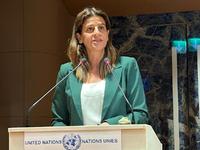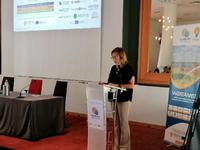Press Releases

02-10-2020 09:03
Announcement by the Office of the Commissioner for Volunteerism and Non-Governmental Organizations on the International Day of Non-violence
International Day of Non-Violence is celebrated every year on October 2, the birthday of Mahatma Gandhi. The United Nations established this International Day on 15 June 2007, by resolution of the General Assembly. Gandhi lived from 1869 to 1949 and was the leader of the Indian independence movement, but also a pioneering inspirer of the philosophy and strategy of nonviolence.
According to the resolution, International Day of Non-Violence is an excellent opportunity “to spread the message of non-violence everywhere, through public awareness and education”. The resolution reaffirmed “the timelessness of the principle of non-violence around the world”, and at the same time, the need “for peace, tolerance and understanding to prevail”.
Presenting the resolution before the General Assembly on behalf of the 140 supporting countries, Indian Foreign Minister Anand Sharma said that the broad support for the resolution reflected global respect for Mahatma Gandhi and his ever-present philosophy. As Gandy himself has said: “Non-violence is the greatest power that humanity has. It is more powerful than the most powerful weapon ever invented by man”.
Nonviolence – or otherwise non-violent reaction – rejects the use of physical force to achieve social or political change. This form of social struggle, often referred to as “ordinary people's politics”, has been widely adopted by people around the world in their quest for social justice.
At the Office of the Commissioner for Volunteerism and Non-Governmental Organizations, we share the principles of non-violence. We respect Gandy's philosophy and admonitions, which are still valid today. In our country, civil society and non-governmental organizations raise their conviction against violence at every opportunity. With ethics and dignity, they work quietly to achieve the goals they set in their field, carrying out whenever necessary, protests, marches and other related actions. Because only through these means, can social change and social justice be achieved.
(EK/II)
Relevant Press Releases







